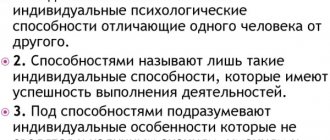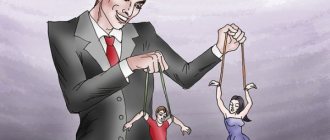Communicating with the people around us, it is easy to notice that we are all different. This is an obvious truth. However, while remaining unique individuals with their own individual characteristics, people may have similar traits, qualities, and characteristics. Even ancient philosophers made attempts to classify representatives of the human community, uniting them into groups according to some common characteristics.
But it is almost impossible to create a comprehensive classification, since people can be grouped according to different criteria: characteristics of emotionality, social status, level of intelligence, interests, goals, etc. In the 20th century, with the development of psychological science, the classification of types of people began to focus on characteristics of their inner world, that is, the psyche, and the concept of “psychotype” appeared. Currently, there are many psychological typologies, and we will introduce you only to the most popular ones.
What are personality psychotypes
Let's give a definition. In simple words, a person’s psychotype is a complex of mental characteristics that determine a person’s behavior and his reactions to external stimuli.
It is generally accepted that K.G. was the first to talk about personality types in psychology. Jung. He was the first to identify general patterns that made it possible to name four psychotypes of personality:
- Extroverts and introverts. The first ones are open to the world, actively interact with it, and willingly and easily make new acquaintances. The latter are distinguished by restraint and a tendency to solitude. Introverts do not like superficial communication; in social contacts they prefer to “work” for quality rather than quantity.
- Rational and emotional type. The first ones reason a lot, carefully weigh the pros and cons, and make extremely informed decisions. The latter succumb to emotions and other people's influence, commit impulsive actions, and easily change their minds.
- Sensory and intuitive. The first type focuses only on his feelings, sensations (he needs to touch, try, see everything). The second type trusts their intuition.
- Mental-logical and emotional-sensual type. The first type confidently moves towards its goals and changes circumstances if necessary. The second type goes with the flow of life, adapts to changing circumstances and does not try to change the environment.
As you can see, this classification is based on different principles for determining personality psychotypes. This is far from the only typology of psychotypes that psychologists focus on. We will analyze others, but in a separate block.
Interesting! All classifications of psychotypes are similar to each other. The names change, but the essence, that is, the leading personality traits remain practically unchanged. Therefore, in practice, you can focus on the typology that you like best.
Type one. North
This is an authoritarian leader. The personality is bright, attractive, but at the same time not the most comfortable to communicate with. North loves to be the center of attention and does not need anyone's opinion. He is surrounded by a retinue, which is difficult to break into, and each of whose members works to maintain his ego. It is difficult for him to fit into the team because he is used to being at the top. When trying to achieve something from a person, he would rather give orders than seek a common language.
This type is a tough diplomat. He can pronounce all the conditions, emphasizing that he follows the rules, but more often these rules are emphasized in order to remind the interlocutor of them.
Women of this type suit the image of a snow queen. Elegance enhanced by slight extravagance, polished manners combined with eccentricity. Competently delivered speech, seasoned with a subtle sense of humor.
It is difficult for this type to restrain himself, but it is by restraining himself that he acquires simply magical charisma. If you are motionless most of the time, every word and gesture takes on value.
It’s not good for Sever to spread himself all over the whole company; choose one interlocutor and give him 90% of your attention, then everyone else will strive to be that same interlocutor.
In the style of this type, like no other, the rule “there must be one center” applies, and this center will collect compliments that must be received with dignity. An elegant base combined with a bright accessory or makeup accent always works.
Types and characteristics of psychotypes
What are the types of personality psychotypes? Let's start with Jung's theory, which we have already looked at. Later, the author expanded it and determined that there are 16 general subtypes of extraversion and introversion, their description:
- Intuitive-logical introversion (critic, Balzac). A fantastically developed imagination is harmoniously combined with logical thinking. This psychotype does not live in fantasies, but skillfully predicts people’s behavior and the development of events, that is, he predicts, and does not fantasize. He does not like passion and emotionality in others; he himself is not distinguished by these qualities. Resists change, interested in personal growth. Due to insufficient emotionality, he appears cold, closed, and sad in the eyes of others.
- Logical-intuitive extraversion (entrepreneur, Jack London). Active and positive psychotype with a business spirit. Likes to do things that no one else knows or can do. Diplomatic and disciplined. He is attentive to his health. She values beauty and comfort in everything. He does not tolerate slowness and indecisiveness, he is always busy with business, developing. Has some problems with empathy.
- Intuitive-logical extraversion (seeker, Don Quixote). Such a person is distinguished by systematic thinking and creativity. He likes to do what no one else can do. He loves everything new and unusual. Rationalism prevails over sensuality, so sometimes people of this psychotype have problems in interpersonal relationships. And also problems arise due to the fact that Don Quixote is susceptible to flattery and expects admiration for his person.
- Logical-sensory extraversion (administrator, Stirlitz). The most rational type. He is distinguished by high efficiency and business spirit. Social status is important to him. He always gets his way, he can bring everyone to clean water. Loves rules and order, hates lies and deceit.
- Sensory-logical extraversion (Marshal, Zhukov). This is a strategist, one of the most purposeful and tough types. Social status and prestige are important to him. Cold in relationships. The craving for leadership manifests itself everywhere: at work, in personal life. Lives by the principle “The end justifies the means.” I'm not used to giving up.
- Logical-sensory introversion (inspector, Maxim Gorky). Always maintains objectivity and pays attention to detail. At the same time, this is an emotional and spiritual psychotype.
- Sensory-logical introversion (master, Gaben). The most cautious and secretive type. Financial well-being is important to him. Characterized by pessimism and emotional stinginess, responsibility and demonstrativeness.
- Ethical-sensory extraversion (enthusiast, Hugo). The most passionate and emotional psychotype. If he is passionate about something, he gives himself over to it without reserve. Active and positive type. Sometimes he appears too self-confident in the eyes of others. Social status and career growth are important to him. Characterized by determination and attention to detail.
- Sensory-ethical extraversion (politician, Napoleon). Does not accept other people's opinions, loves to be a leader. He knows how to win people over; social status is important to him. He does not tolerate criticism and demands, but he criticizes others and is demanding with others.
- Ethical-intuitive extraversion (mentor, Hamlet). He is prone to dramatization and is fixated on global problems. He always fights for good, but in his personal ideas. At the same time emotional and secretive, he does not like to make personal things visible to everyone. Knows how to attract others and lead them. He likes to do what no one else can do.
- Intuitive-ethical extraversion (adviser, Huxley). She is distinguished by flexible thinking and high adaptive abilities, and can find an approach to any person. Masterfully knows how to switch from feelings to rationality and back.
- Ethical-sensory introversion (guardian, Dreiser). A tactful, punctual and sensitive type, able to find a common language with any person. He is vindictive, but at the same time grateful, that is, he responds to people in the same way that they give. Doesn't like to wait, lives one day at a time. He doesn’t waste words and doesn’t tolerate betrayal.
- Sensory-ethical introversion (mediator, Dumas). The most humane and positive type. He will always help, but he doesn’t know how to ask for help. In the eyes of other people, he sometimes looks weak-willed. Pays attention to details, loves aesthetics and comfort.
- Ethical-intuitive introversion (humanist, Dostoevsky). A person with a rich inner world. Outwardly he looks reserved, but passions are always boiling inside him. Has a high level of empathy. Does not tolerate cheating and betrayal.
- Intuitive-ethical introversion (lyricist, Yesenin). Romantic and dreamy psychotype. Constantly hovering in his thoughts or fantasies. Lives in the future (often fictional), and not in the present. Has a high level of empathy and creativity.
- Logical-intuitive introversion (analyst, Robespierre). Hates superficial communication or training, loves to delve into the essence of events. Due to his developed will and excessive demands, others sometimes perceive him as a cruel and harsh type. The psychotype is distinguished by creativity and developed logical thinking.
Another popular typology of psychotypes in psychology belongs to K. Leonhard. He identified 12 main personality psychotypes and their characteristics:
- Hyperthym. Active and sociable type. Does not tolerate loneliness, routine, boredom, or monotonous work. Loves attention, new impressions and emotions. When communicating, he often gets distracted from the main topic, sometimes talks too much, and reveals his own and other people’s secrets.
- Distim. Closed, unemotional and uncommunicative type. Prefers to be in solitude, does not like entertainment and fleeting pleasures. Distim has practically no friends. This is a passive but responsible type. He does the work assigned to him well and knows how to keep secrets. Has a heightened sense of justice and increased criticism of himself and others.
- Cycloid. This is a man of mood. Moreover, the mood can change both several times a month and several times a day. The phases of the cycle are directly opposite to each other: sometimes everything is bad, then everything is good, joy is replaced by sadness, activity by passivity, self-confidence by uncertainty, openness by closedness, etc.
- Excitable. This is an irritable and secretive person, prone to affect. He is responsible and disciplined, but his thirst for power pushes other people away. For the excitable type, personal interests come first. He loves order, rules, discipline.
- Stuck. Distrustful, vengeful and jealous type. When you first meet him, you get the impression that he is a modest, silent person. In fact, he is a demanding person towards himself and others, prone to moralizing. People of this type often become involved in conflicts. Another feature of the psychotype is getting stuck in negative situations. Such people experience some event for a long time, exhausting themselves and others.
- Pedant. A person obsessed with trifles and formalities, always achieving his goals. Often such people reach leadership positions. And if at work their passion for formalities does not interfere so much with building healthy relationships, then in their personal life and everyday life it causes noticeable discomfort.
- Anxious. Timid, indecisive, reserved person. He delays making decisions until the last minute, hoping that the situation will change on its own or that someone else will suggest the correct answer. These are dependent people who do not know how to say “no” and ask for help. Fear of rejection and negative thinking (sees obstacles in everything, fantasizes about negative developments of events) force him to be dutiful, faithful, and careful.
- Emotive. This psychotype has the highest level of empathy. He tries to see the good in everything and everyone, fights for peace throughout the world. Open, positive, kind person. Sometimes his kindness and ability to empathize are transformed into reliability. Emotive tends to take on too many responsibilities (mostly those of others), fails to cope with most of what he has acquired, and because of this receives the status of an irresponsible person in the eyes of other people.
- Hysteroid. This type spends his whole life on show. He attracts attention by any means. The hysteroid needs emotions and admiration. He feeds off the energy of other people. He knows how to win over and entice, but over time those around him get tired of the obsessiveness and excessive artistry, the ostentation of the hysteroid. Hysterics, like those who surround them, become participants in scandals and conflicts. In modern realities, hysteria is manifested by the pursuit of likes and fame.
- Exalted. Open, romantic type. Avoids conflicts, but argues often and a lot. Such people are characterized by increased emotionality and sensitivity.
- Extrovert. Active, sociable and open people. They need social contact and like to spend time in noisy companies. Have problems concentrating. Their interests change quickly. They master a lot, but superficially. Relationships in most cases are also superficial.
- Introvert. Closed people with a stable system of principles from which they never deviate. They prefer privacy. If they are interested in something, they delve into the very essence.
There are other classifications of personality types. For example, sensory typology. It is based on the specifics of information perception, the leading channel of perception. According to this classification, there are the following psychotypes of people:
- Visual psychotype. It is better for such people to see once than to hear a hundred times. Images, colors, clarity, and gestures are important to them. People of the visual psychotype do not tolerate disorder or negligence. Moreover, this applies to both appearance and, for example, order in the house. Hint phrases from the vocabulary of a visual person to determine his psychotype: “Let’s take a look,” “I see that this is not what you wanted to say.”
- Auditory psychotype. Such people are used to listening. They pay attention to the interlocutor’s speech, voice timbre, tone. Cue phrases from the auditory vocabulary to determine his psychotype: “I heard you,” “Listen to me.”
- Kinesthetic psychotype. People of this psychotype are used to feeling. It is important for them to feel everything, to try it on themselves. Clues from the kinesthetic vocabulary to determine his psychotype: “I feel that you want to tell me something,” “I felt that there was something wrong in this matter.”
In addition, within the framework of typologies of psychotypes it is customary to talk about temperaments. I think you've heard something about choleric people, phlegmatic people, melancholic people, sanguine people. These are the names of 4 human psychotypes. Let us briefly analyze their characteristics in table form:
| Temperament | Properties of the psyche | Leading personality traits |
| Choleric | Strong, agile, unbalanced type | Emotionality, lack of restraint, inconsistency |
| Sanguine | Agile, balanced, strong type | Leadership qualities, restraint, determination |
| Phlegmatic person | Strong, balanced, still type | Emotionality, prudence |
| Melancholic | Weak, unbalanced, mobile type | Pessimism, passivity, apathy, uncertainty |
Temperament is an innate characteristic. When we talk about a personality’s psychotype, we mean an alloy of innate and acquired properties that have become leading. Therefore, it is not entirely correct to classify temperaments as psychotypes, but still this is the case in psychology.
Introverted thinking type (IMT).
BMI thinks logically, but his thoughts are hardly connected with the real outside world. First, he has the idea itself, and then he looks for confirmation of it in the objects around him. That is, he supplies facts to his formula, rather than creating a formula as a result of studying the facts. Moreover, if there is no evidence that he is right, he calmly ignores it.
Convincing BMI of something that contradicts his own point of view is quite a challenge. Often this is simply not possible. He is firm in his convictions and will change them only if he comes to it himself. The more he is dissuaded from an idea, the more committed he is to it. In principle, he has no need to share his thoughts; he is in no hurry to open them to the world or seek support from it.
This is a great theorist, not an activist; he does not try to find out everything at once. He is much more interested in the depth of this knowledge. That is why this type, as a rule, does not have many hobbies, but the existing ones are thoroughly mastered. Such an introvert is a very paradoxical person:
- has deep knowledge in specific areas, but turns out to be a bad teacher, does not know how to convey information that he understands perfectly in an accessible and comprehensive manner;
- in the eyes of those around him, he is domineering, unapproachable, arrogant, cold, sometimes embittered, but the closer people get to him, the more they warm up to him, see him naive, “lost,” and begin to value his closeness;
- when there is a discrepancy between ideas - his own and public ones - he is protected from the opinions of others to such an extent that he sometimes ignores the most obvious and undeniable arguments. Even constructive criticism may not be accepted if it goes against his subjective beliefs;
- can admit the most daring, daring, dangerous thoughts, but when it comes to expressing or actively implementing even the most harmless ideas, he is timid and gives in.
He tends to comprehend everything that happens to him. He even tries to understand emotions and feelings with his brain, and since he is not very good at this, he simply suppresses all experiences or abstracts from them. When communicating, he tries to be polite and kind, but does it with caution, since his outward cordiality is caused by a subconscious desire to “disarm” his interlocutor.
BMI is very secretive, stubborn, and does not lend itself to outside influence in achieving his goals. Constantly experiences doubts, creates restrictions, and is cautious. In this regard, he is isolated and secluded. It is difficult for him to express himself in such a way that everyone understands the essence of his words, which is why he sometimes considers himself unheard, lonely, and others as stupid. But if this type nevertheless finds someone who understands him, then he begins to overestimate and idealize this person.
The main advantages are depth of knowledge, ability to get to the bottom of things, thoroughness. Cons: Poorly developed social skills, inability to understand people.
How to determine a psychotype by external signs and behavior
I propose to once again go over all the considered personality psychotypes and identify only the external signs and behavioral characteristics that are noticeable to the naked eye.
Let us take for consideration Leonhard’s psychological classification:
| Psychotype | External manifestations |
| Hypertim | Active gestures and expressive facial expressions, childlike spontaneity in emotions, careless appearance |
| Distim | Restrained facial expressions and a minimum of gestures, apathetic and pitiful appearance |
| Cycloid | Clothes, hairstyle, gestures - everything reflects the mood. In moments of rising, he is a person with active gestures and rapid speech, wearing clean and perfectly ironed clothes. During the phase of loss of strength, the cycloid becomes indifferent to its appearance, and a mask of sadness freezes on its face. Cycles repeat in the same rhythm, but unique to a particular person |
| Excitable | Always dressed to the nines, neat and stylish. Looks at others condescendingly, sometimes dismissively |
| Stuck | Speech is sluggish, but gestures are very clear and sharp. Slow, thoughtful |
| Pedant | Cleanliness and neatness are noticeable in everything, the appearance is neat |
| Anxious | Chooses discreet, practical, versatile clothes. Tries not to stand out from the crowd and not attract attention. He is restrained in his emotions, his speech is quiet, most representatives of the anxious type slouch |
| Emotive | Dressed tastefully, but modestly and calmly. In general, gentleness, kindness, calmness is reflected in everything: gait, gestures, facial expressions, hairstyle, clothing, manner of speech. |
| Hysteroid | Appearance (clothing, hairstyle, gait) is defiant, extravagant, unusual. It could be something very bright or vulgar, not appropriate for the time (for example, a top hat and tails as casual wear), etc. In general, the main thing for a hysterical person is to stand out. And loud laughter and loud or, on the contrary, too quiet speech (depending on the circumstances), strange clothes and shoes, mannerisms, etc. help in this - it doesn’t matter |
| Exalted | Frequent changes in facial expression and posture, gait (depending on mood), violent emotional reactions to certain events, shaking a leg or tapping fingers (this is how excitement is manifested), loud speech and infectious laughter |
| Extrovert | Fast and loud speech, active facial expressions and gestures, bright clothes |
| Introvert | Clothing in calm tones, restrained facial expressions and gestures, calm speech. If they talk alone with their best friend or talk about something interesting to them, they become emotional |
Note! Due to the fact that there are no pure temperaments, and character traits are intertwined with mental characteristics, it can be difficult to externally determine a person’s psychotype. Therefore, the most accurate method of diagnosis is to undergo special tests by Jung, Leonhard, Eysenck and other psychologists, and not to observe a person.
Introverted feeling type (ITS).
No matter how paradoxical it may sound, the ICT gives the impression of a cold, indifferent person, detached from the world in his feelings. Those around him consider him indifferent in almost everything, calm, unperturbed. He really looks silent, difficult to reach, incomprehensible. But this is only the outer shell. As cold as this type is on the outside, he is just as passionate on the inside. His feelings are deep, intense, strong. But they really play a greater role for HCI than the emotions of other people or the need to express inner feelings.
Jung believed that among representatives of this type there are much more women than men. Their subjective values are so important to them that they sometimes tend to exaggerate them, make them more intense, or even invent them and instill them in themselves. What they cope with successfully. Among them there are often melancholic people in the full sense of the word. In relationships they prefer:
- adhere to safety, tranquility, the golden mean in everything, do not resort to extremes or risks;
- fence off from passion, vivid manifestations of feelings, impulses. They themselves cannot be passionate outwardly, and if their partner turns out to be so, then they close themselves off from him, move away;
- do not dominate people, but unconsciously still sometimes do it. In this case, their influence takes on the appearance of suffocating and constraining. Their loved ones begin to feel that they have been placed within the framework of a non-existent ideal and any deviation from it will force the ICT to ignore or completely renounce their relatives;
- constantly look for flaws, deviations from the “norm” in relationships. Therefore, they often doubt, experience groundless suspicions, and jealousy. In more rare cases, they show paranoia.
This type of introvert is very protective of his feelings and tries to protect them from any interference. If someone around you shows their impulses and emotions publicly, the ICT will first try to show neutrality. Perhaps with a little bit of criticism, teaching, or superiority. But the stronger and more assertive the emotional reaction of the interlocutor, the greater the chance that the introvert will abruptly and coldly stop such behavior.
They are always in search of “ideal”, sublime, standard feelings, and simply do not exchange for less. They absolutely need everything to be as in classic novels and melodramas - purely, spiritually, platonically, unconditionally. They often associate exemplary experiences with some kind of spirituality, religiosity, or poetry.
To become the best version of oneself, it is advisable for the HCI to approach affairs with great internal dispassion (external is enough) and not be afraid to take control into one’s own hands and take initiative.
Secrets of interaction with each psychotype
Let's look at the specifics of interaction with each of the psychotypes according to Leonhard's classification:
- Hyperthym. Help hypertim direct energy in a useful direction, give direct instructions, entice him into something like a child. Do not criticize him or set strict boundaries, respect the hypertim’s freedom and his interests. That is, in choosing a hobby you need to find what attracts him.
- Distim. Avoid criticism, harsh language, and arguments. Respect the rigidity of the dystimus, do not leave it alone with something new. Give compliments and support his self-confidence. Let's take some time to rest. Remember that distim gets tired quickly. Help him develop his abilities and overcome suspiciousness and uncertainty.
- Cycloid. It is interesting to live and communicate with such people. They are unpredictable and creative. However, this also becomes a cause of conflicts in business or personal relationships. Dealing with this type is like riding a roller coaster. What to do? Determine the cycle specifically for your friend. Learn to independently identify phases and adapt to them. For example, if you have long wanted to ask a cycloid for something, then wait until he is in a good mood. If you understand that now he has a loss of strength, then it is better not to overload him with anything and not to irritate him. It is important to accept the fact that the cycloid's brain cannot work any other way. Therefore, there is no point in being offended, making trouble, or trying to change a person.
- Excitable. Always strictly guard your personal boundaries and maintain social distance. Do not make concessions, prove your importance and authority. Do this with restraint so as not to provoke the person into rash actions.
- Stuck. Try to protect a person with a stuck psychotype from uncertainty. Be as consistent, open and clear as possible. Give instructions, say everything directly. However, don't let the stuck type violate your personal boundaries. Make it clear that you will not be pushed around. If you lack support, understanding and warmth from a stuck type, then find it elsewhere, for example, turn to friends.
- Pedant. One of the most difficult types. There are two options: either you accept his meticulousness, or leave this relationship. A pedant needs correctness, stability, and conscientiousness. The main thing is that the other participant in the relationship does not end up in a neurosis clinic in pursuit of this.
- Anxious. Encourage and praise him, show signs of attention, express your trust. Don't criticize unnecessarily. And if you have to do this, then first praise, and then wrap the criticism in the wrapper of a wish (“You’re doing everything well, if only… then you wouldn’t have any value at all”). Give more clear instructions, do not leave him alone in unfamiliar, frightening situations.
- Emotive. Never lie to an emotion. This is the only thing he does not accept. In all other cases, he himself will find an excuse, an explanation, a special approach for you. Don't play with emotive feelings, don't try to hide something. For example, if you are not interested in a person, then say so directly. He will not be offended or angry, but will step aside in a friendly and tactful manner. But a lie can offend him.
- Hysteroid. Help the hysteroid feel like the first, the best. This does not mean that you need to worship and obey him - be subtle. However, one should not admire too much and feed the illusion of superiority. That is, you can emphasize the real merits and achievements of the hysteroid. Get ready for your successes to anger and irritate him. Don't give in to provocations.
- Exalted. Avoid surprises, do not arrange surprises for the exalted type. Create the most stable soil in your relationship. Monitor your emotional reactions. Be discreet. Do not take his mood swings and affective outbursts personally. Do not enter into conflicts with an exalted type.
- Extrovert. Respect his need for social contact. Do not encroach on personal space or limit the freedom of an extrovert. For example, if your girlfriend is an extrovert, then you cannot ask her to communicate less with her friends and girlfriends, or to stay at home more often. In the end, you yourself will get tired of its activity. True, if you are both extroverts, you can find a source of strength in each other.
- Introvert. Respect personal space and the need for privacy. Do not get into the soul of an introvert; give him time for personal hobbies. Don't torment him with formal conversations.
Knowing these basics, you will be able to draw up a more complete, detailed and accurate plan for interaction specifically in your case. And to make this even easier, I recommend that you determine your psychotype and identify your strengths and weaknesses.











